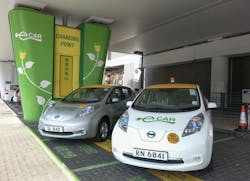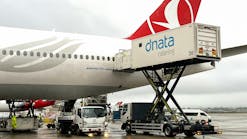Hong Kong Air Cargo Terminals Limited (Hactl) – Hong Kong’s largest independent cargo handler – has had its targets for science-based greenhouse gas emissions reductions approved by the Science Based Targets initiative (SBTi). SBTi’s Target Validation team has confirmed that Hactl’s targets comply with SBTi Criteria and Recommendations, and that Hactl’s scope 1 and 2 target ambition is in line with a 1.5°C trajectory for limiting global temperature rises.
Hactl made a public commitment to SBTi in 2022. Over the ensuing 18 months, Hactl’s Safety, Sustainability and Quality Assurance team has been working on setting targets, based on the SBTi criteria. Hactl has now committed to reduce absolute scope 1 and 2 GHG (greenhouse gas) emissions by 50.4 percent by 2030, from a 2018 base line. The company also commits to reduce absolute scope 3 GHG emissions from purchased goods and services, fuel- and energy-related activities, waste generated in operations, employee commuting and downstream leased assets by 50.4 percent within the same timeframe. The target boundary includes land-related emissions and removals from bioenergy feedstocks.
The Science Based Targets initiative (SBTi) is a global body enabling companies and financial institutions to set ambitious emissions reduction targets in line with the latest climate science. The SBTi’s goal is for businesses across the world to support the global economy in halving emissions before 2030, and achieving net-zero before 2050.
SBTi is a collaboration between CDP, the United Nations Global Compact, World Resources Institute (WRI) and the World Wide Fund for Nature (WWF); it is also one of the We Mean Business Coalition commitments. The SBTi defines and promotes best practice in science-based target setting, offers resources and guidance to reduce barriers to adoption, and independently assesses and approves companies’ targets.
To ensure maximum transparency, accountability, and corporate leadership, Hactl is required to publicly report progress against its targets on an annual basis, along with its company-wide GHG emissions inventory.
Among the many measures Hactl will employ to achieve Hactl’s SBTi targets, are replacing internal combustion-powered vehicles and ground support equipment (GSE) with electric versions; procuring Renewable Energy Certificates (RECs); increasing the use of energy efficient lighting and heating, ventilation and air conditioning (HVAC) systems; working with suppliers to reduce Hactl’s upstream emissions, especially from purchased goods and services; implementing digital management systems to eliminate paper use; and devising innovative ways of diverting wood, paper, plastics, and mixed waste from landfill.
Wilson Kwong, chief executive of Hactl, says: “SBTi is the gold standard in targeting and reporting reductions in emissions. We are proud to be an early adopter of the scheme in the aviation sector, and to have had our near-term targets approved.
“But this is just the first step. The latest climate science from the IPCC (The Intergovernmental Panel on Climate Change) shows it is still possible to limit global temperature rises to 1.5°C, but we are running dangerously close to that threshold. Urgent action is therefore vital, and Hactl aims both to play its part and set an example for our industry.”




